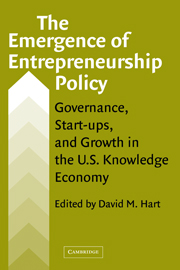 The Emergence of Entrepreneurship Policy
The Emergence of Entrepreneurship Policy Book contents
- Frontmatter
- Contents
- Editor's Acknowledgments
- Contributors
- PART ONE THE ENTREPRENEURIAL SOCIETY: WHAT'S GOVERNANCE GOT TO DO WITH IT?
- PART TWO HIGH-TECH ENTREPRENEURSHIP: THE UNIVERSITY-INDUSTRY-GOVERNMENT CONNECTION
- PART THREE EQUITY ISSUES IN ENTREPRENEURSHIP POLICY
- 7 Venture Capital Access: Is Gender an Issue?
- 8 Minority Business Assistance Programs Are Not Designed to Produce Minority Business Development
- PART FOUR SECTOR-SPECIFIC ISSUES
- PART FIVE IMPLEMENTING ENTREPRENEURSHIP POLICY
- Afterword
- References
- Index
7 - Venture Capital Access: Is Gender an Issue?
Published online by Cambridge University Press: 18 December 2009
- Frontmatter
- Contents
- Editor's Acknowledgments
- Contributors
- PART ONE THE ENTREPRENEURIAL SOCIETY: WHAT'S GOVERNANCE GOT TO DO WITH IT?
- PART TWO HIGH-TECH ENTREPRENEURSHIP: THE UNIVERSITY-INDUSTRY-GOVERNMENT CONNECTION
- PART THREE EQUITY ISSUES IN ENTREPRENEURSHIP POLICY
- 7 Venture Capital Access: Is Gender an Issue?
- 8 Minority Business Assistance Programs Are Not Designed to Produce Minority Business Development
- PART FOUR SECTOR-SPECIFIC ISSUES
- PART FIVE IMPLEMENTING ENTREPRENEURSHIP POLICY
- Afterword
- References
- Index
Summary
Diana was a heroic woman, a huntress. Women seeking capital are hunters rather than gatherers. They are hunting for capital in a traditionally male dominated arena.
Women's participation in entrepreneurship is vital to the growth of the U.S. economy. It is not surprising, then, that breaking down gender barriers and facilitating the start-up and development of women-owned businesses has been at the forefront of public policy for several decades. Legislative changes such as the Civil Rights Act of 1964, the Equal Credit Opportunity Act of 1975, and the Affirmative Action Act of 1978 were pioneering efforts to address some of the challenges that women faced in starting and growing their own businesses. Baseline data on women's participation as business owners in the wake of these efforts were first made available in The Bottom Line (President's Interagency Task Force 1979). Ten years later passage of the Women's Business Ownership Act provided set-asides for women business owners, created the National Women's Business Council, called for additional data collection, and established new federal capacities to guarantee loans to women-owned businesses.
More recently, women's entrepreneurship policy has been manifested in a wide range of federal, state, and local programs. Relevant federal initiatives include the Small Business Administration (SBA)'s preferential procurement program (known as section 8(a)), which provides government contracts and other assistance to small businesses owned by socially and economically disadvantaged persons; the Women-owned Business Procurement Program, which teaches women how to market to the federal government; the Women's Demonstration Program, which provides women with long-term training and counseling for all aspects of owning and managing a business; and the Women's Network for Entrepreneurial Training, which arranges for experienced women owners to serve as mentors to others.
- Type
- Chapter
- Information
- The Emergence of Entrepreneurship PolicyGovernance, Start-Ups, and Growth in the U.S. Knowledge Economy, pp. 141 - 154Publisher: Cambridge University PressPrint publication year: 2003
- 10
- Cited by


